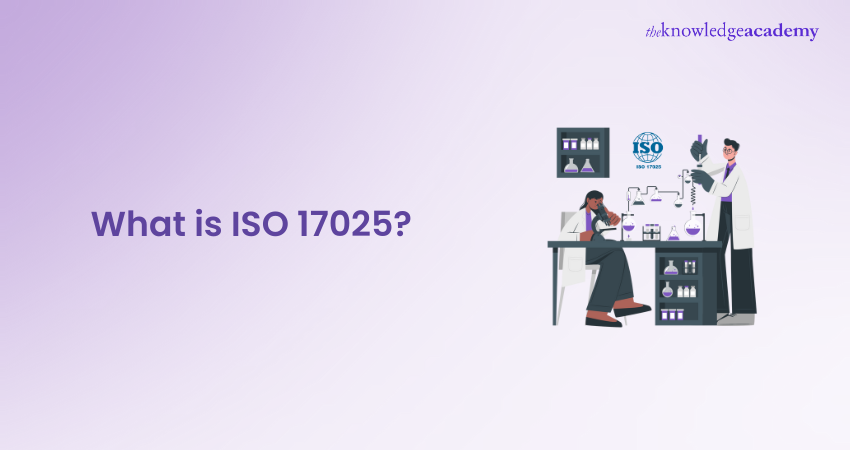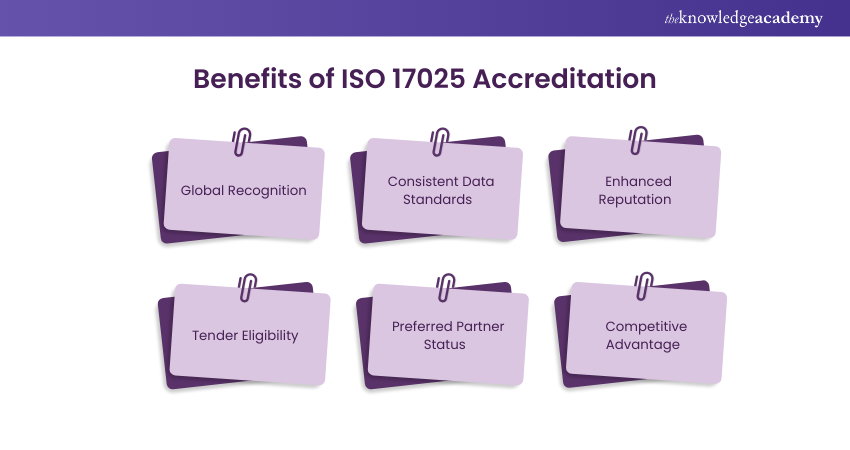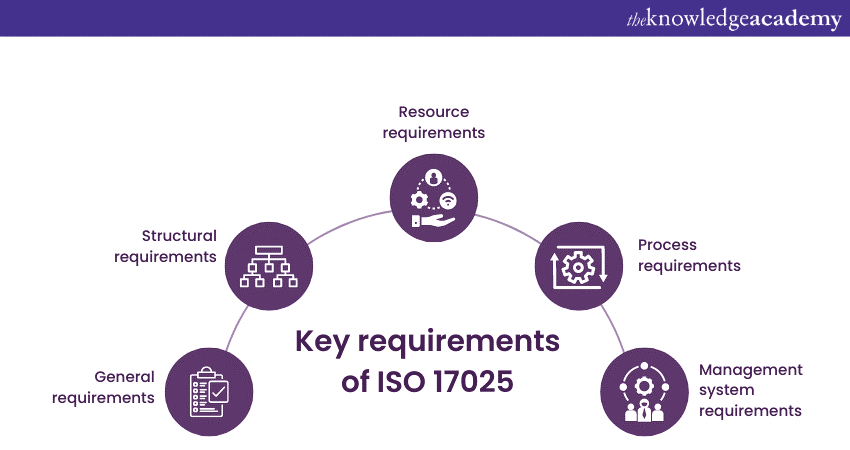We may not have the course you’re looking for. If you enquire or give us a call on +971 8000311193 and speak to our training experts, we may still be able to help with your training requirements.
We ensure quality, budget-alignment, and timely delivery by our expert instructors.

How can your lab stand out in a world where accuracy and trust are paramount? ISO 17025 is the global standard that sets the benchmark for excellence in testing and calibration. It ensures your lab meets the highest standards of accuracy and reliability, earning worldwide recognition. By achieving ISO 17025 Certification, you demonstrate your commitment to quality, attract more clients, and access new markets. Ready to elevate your lab’s reputation? Let’s discover What is ISO 17025 and how it can transform your operations and give you a competitive edge.
Table of Contents
1) What is ISO 17025?
2) Benefits of ISO 17025 Accreditation
3) Key Requirements of ISO 17025
4) What is the Certification Process for 17025 Accreditation?
5) Conclusion
What is ISO 17025?
ISO 17025 is a global standard that sets the benchmarks for excellence and competency in testing and calibration laboratories. It requires these labs to implement top-tier quality processes and establish a reliable Quality Management system to validate and demonstrate their expertise.
ISO/IEC 17025, the full name of the standard, was created through the collaboration between the International Organisation for Standardization and the International Electrotechnical Commission. However, it is often shortened to ISO 17025 or simply referred to as 17025 Certifications. To ensure compliance, many organisations refer to an ISO 17025 Checklist to guide them through the certification process.
Ultimately, ISO 17025 Implementation is relevant to any organisation involved in testing, sampling, or calibration that aims to ensure the credibility of its results Simply put, if your work involves producing measurable outcomes, ISO 17025 likely applies to you. Even if your facility isn’t traditionally called a "lab," under ISO 17020 Guide guidelines, it would be considered a laboratory if it produces quantifiable results.
Benefits of ISO 17025 Accreditation
Acquiring ISO 17025 accreditation provides numerous benefits when it comes to test and calibrate laboratories. Understanding the Benefits of ISO 17025 Accreditation is essential, as it enhances a laboratory's credibility, improves operational efficiency, ensures accurate and reliable results, and boosts customer confidence. Here are some of the advantages:

1) Global Recognition
Obtaining ISO/IEC 17025 Certification guarantees organisations around the world that your lab adheres to high quality standards and produces dependable results, solidifying its reputation as a reliable and credible player in the international marketplace.
2) Consistent Data Standards
Conforming to ISO 17025 Principles guarantees that your laboratory's information adheres to worldwide standardised criteria, meeting the growing need for consistency in testing and calibration, crucial for international cooperation and adherence.
3) Enhanced Reputation
Obtaining ISO 17025 Certification greatly enhances the standing of your laboratory, both on a global scale and within your own country, establishing you as a top provider of quality and dependability in your field, drawing in a larger clientele and collaborators.
4) Tender Eligibility
Certification is frequently a vital necessity for tender applications, providing your laboratory with the essential qualifications to vie for high-paying contracts and opportunities that require strict quality criteria.
5) Preferred Partner Status
Obtaining ISO 17025 significantly boosts the likelihood of being chosen as a favored partner by existing and potential clients, improving lasting business connections and cultivating customer loyalty.
6) Competitive Advantage
Having ISO 17025 accreditation gives your lab a competitive edge compared to rivals without this certification, making it the top choice for clients in need of trustworthy testing and calibration services.
Learn to implement ISO Methodologies with our ISO Certification Course today!
Key Requirements of ISO 17025
ISO 17025 sets forth several key requirements that laboratories must fulfil to achieve accreditation. These requirements ensure testing and calibration laboratories' competence, impartiality, and consistent operation. The key requirements of 17025 are divided into the following:

a) General Requirements: It includes two factors - impartiality and confidentiality. Impartiality implies that the laboratory must not prioritise commercial, financial or other benefits to compromise the quality of results. Confidentiality ensures the laboratory keeps the results and information private.
b) Structural Requirements: This involves employing personnel with appropriate qualifications, experience, and training. They must also ensure the use of validated test methods, proper calibration of equipment, and the availability of necessary resources.
c) Resource Requirements: This includes document control, personnel training, handling of non-conformities, and management review processes.
d) Process Requirements: It involves activities such as quality assurance, sampling and reporting results. This ensures the accuracy and comparability of test and calibration results.
e) Management System Requirements: These requirements are divided into two options, A and B. Option B will be applicable if a laboratory is part of a large organisation or has its own effective management. On the other hand, if the laboratory’s Quality Management system is independent of any other management system, option A applies.
Learn to conduct Internal Audit effectively with our ISO 17025 Internal Auditor Course – Register now!
What is the Certification Process for 17025 Accreditation?
The ISO 17025 Certification process involves several steps that laboratories must follow to obtain accreditation. Here is an overview of the typical certification process:
Step 1: Familiarise yourself with the requirements of 17025. This includes:
a) Understanding the standard and its scope
b) Training all personnel about the management and technical activities
Step 2: Document laboratory activities. It involves documenting policies, procedures and work instructions to ensure compliance with the standard’s requirements.
Step 3: Identify areas for improvement and ensure that the laboratory’s processes are functioning effectively.
Step 4: Review the preparedness of your organisation. Before applying for accreditation, your laboratory must meet the accreditation body’s requirements. It means that you need to possess the following:
a) All necessary documents
b) Internal audit program
c) Records of all management reviews and method validations
Conclusion
We hope you have understood What is ISO 17025? ISO 17025 plays a crucial role in establishing the competence, credibility, and quality of testing and calibration laboratories. Therefore, achieving 17025 accreditations and maintaining comprehensive and well-documented ISO 17025 Documentation can position laboratories as trusted providers in their respective industries, contributing to overall quality and safety.
Gain the skills to implement effective Quality Management systems with our ISO 17025 Foundation Course – Join now!
Frequently Asked Questions
How Does ISO 17025 Differ From ISO 9001?

ISO 17025 prioritises laboratory competency in testing and calibration, whereas ISO 9001 highlights overall Quality Management systems in different sectors.
What Types of Businesses Benefit From ISO 17025 Accreditation?

ISO 17025 accreditation is advantageous for testing and calibration laboratories, research institutions, and quality assurance departments as it guarantees dependable, universally acknowledged outcomes.
What are the Other Resources and Offers Provided by The Knowledge Academy?

The Knowledge Academy takes global learning to new heights, offering over 3,000 online courses across 490+ locations in 190+ countries. This expansive reach ensures accessibility and convenience for learners worldwide.
Alongside our diverse Online Course Catalogue, encompassing 19 major categories, we go the extra mile by providing a plethora of free educational Online Resources like News updates, Blogs, videos, webinars, and interview questions. Tailoring learning experiences further, professionals can maximise value with customisable Course Bundles of TKA.
What is The Knowledge Pass, and How Does it Work?

The Knowledge Academy’s Knowledge Pass, a prepaid voucher, adds another layer of flexibility, allowing course bookings over a 12-month period. Join us on a journey where education knows no bounds.
What are the Related Courses and Blogs Provided by The Knowledge Academy?

The Knowledge Academy offers various ISO 17025 Training, including the ISO 17025 Foundation, ISO 17025 Lead Auditor, and ISO 17025 Lead Implementer. These courses cater to different skill levels, providing comprehensive insights into the ISO 17025 Checklist.
Our Health & Safety Blogs cover a range of topics related to ISO, offering valuable resources, best practices, and industry insights. Whether you are a beginner or looking to advance your Health & Safety skills, The Knowledge Academy's diverse courses and informative blogs have got you covered.
Upcoming Health & Safety Resources Batches & Dates
Date
 ISO 17025 Foundation
ISO 17025 Foundation
Mon 18th Aug 2025
Mon 24th Nov 2025






 Top Rated Course
Top Rated Course



 If you wish to make any changes to your course, please
If you wish to make any changes to your course, please


